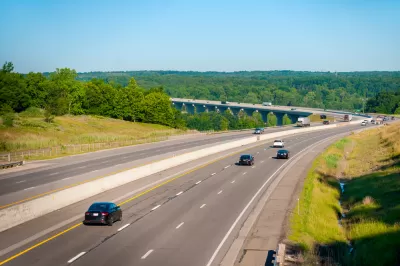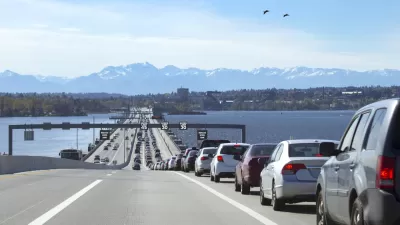On July 1, motorists in Ohio will pay an additional 10.5 cents per gallon to fill up, while truckers will pay 19 cents per gallon more on diesel fuel sales. Accompanying the tax hikes are two controversial provisions that DeWine chose not to veto.

It's been 16 years since the Ohio Legislature last voted to increase the state's gas tax, now 28.01 cents per gallon, almost six cents less than the national average, according to API. On Tuesday, the General Assembly passed House Bill 62, a two-year state transportation budget bill, thanks in part to the state's new Republican governor, Mike DeWine, and a concerted effort by a diverse coalition who advocated for improving transportation infrastructure.
His predecessor, Republican Gov. John Kasich, never hiked the gas tax during his two terms. He raised around $1.5 billion for state highway projects through selling Ohio Turnpike bonds in 2013, leaving the next governor with a pressing transportation challenge.
The legislative road to a 10.5 cents gas tax increase
With Ohio being a Republican state government trifecta, the main challenge would be getting the two chambers of the General Assembly to agree. Democrats were largely on-board with hiking taxes, but by how much turned into a Republican party disagreement between the two chambers
In his March 5, state-of-the-state address, DeWine had asked for an 18-cents hike to the gas tax, indexed to inflation. Hours later, House Finance Committee chair Scott Oelslager (R-Canton), announced that HB 62 would call for a 10.7 cents gas tax hike and a 20-cents diesel tax increase, with no indexing.
"Registration for electric vehicles will be $200, and hybrids $100," reported Karen Kasler for Statehouse News Bureau (audio available). "And public transit funding would go from $40 million to $70 million." It also added a provision striking the state requirement for a front license plate, against the wishes of many law enforcement groups.
DeWine had said the 18 cent increase would bring in $1.2b, and says this proposal is grossly inadequate.
The Senate balked at the 10.7-cents hike, and approved a six cents increase on March 21 which "would provide around $400 million a year," reported Laura Hancock for Cleveland.com. They also reduced the diesel tax hike to 16 cents.
That’s far less than what was requested by DeWine, who said the deficit in transportation funding in Ohio was around $1 billion at the state level, and a lesser tax wouldn’t begin to address the state’s road problems.
Its version also cuts public transit funding to about half of what the House wanted. And it removes the House’s provision that only one license place would be required per vehicle. [And lowered the EV fees to "$175 for plug-in electric motor vehicles and $75 for hybrids.]
On Tuesday, a compromise was struck between the two chambers, reports Jim Siegel for The Columbus Dispatch. "The legislation is to generate about $865 million more per year for road and bridge projects."
They did some serious work and ultimately have delivered something that will give our transportation infrastructure a much-needed influx of revenue,” said Keary McCarthy, executive director of the Ohio Mayors Alliance.
The plan also establishes new registration fees of $200 for electric plug-in vehicles and $100 for hybrids. The fees are estimated to raise $23 million over two years.
The budget also will more than double funding for public transportation, increasing it from $33 million per year to $70 million. Ohio provides among the lowest support in the nation for public transit...
Two controversial parts of the legislation
On Wednesday, DeWine signed HB 62 "and its accompany fuel tax hikes while resisting lobbying calling for line-item vetoes of two provisions," report Siegel and Randy Ludlow of the Dispatch (in the source article). The Senate had apparently yielded to the House on the license plate provision.
Police argue that retaining the front plate allows them — and their license-plate readers — to more easily identify vehicles driven by suspects and regularly help solve crimes, including homicides.
Opponents of the front plate said they harm the aesthetics of vehicles and with evolving technology, increasingly will interfere with warning sensors that detect surround vehicles. Auto dealers complained that drilling holes in vehicle front bumpers to affix a license plate threatens sales to customers in states that do not require a front plate, such as Kentucky.
The second issue dealt with traffic cameras, or more specifically, revenue from the cameras.
Citing their home rule authority, officials of cities with traffic cameras also called on DeWine to kill language that would require cities to handle violations in municipal courts rather than an administrative process, a move that would cost cities revenues from fines. The measure also would require cities to report their traffic camera revenue so the amounts can be deducted from their state local government fund allocations.
Hat tip to David Roseman.
Related in Planetizen:
-
Alabama Is Latest State to Hike Gas Tax, March 31, 2019
-
New Leadership Tasked With Solving Ohio's Transportation Challenges, January 14, 2019
-
Transportation Challenges Looming in Ohio, September 22, 2018
FULL STORY: DeWine signs bill increasing gas tax, resists call for line-item vetoes

Planetizen Federal Action Tracker
A weekly monitor of how Trump’s orders and actions are impacting planners and planning in America.

Maui's Vacation Rental Debate Turns Ugly
Verbal attacks, misinformation campaigns and fistfights plague a high-stakes debate to convert thousands of vacation rentals into long-term housing.

San Francisco Suspends Traffic Calming Amidst Record Deaths
Citing “a challenging fiscal landscape,” the city will cease the program on the heels of 42 traffic deaths, including 24 pedestrians.

Defunct Pittsburgh Power Plant to Become Residential Tower
A decommissioned steam heat plant will be redeveloped into almost 100 affordable housing units.

Trump Prompts Restructuring of Transportation Research Board in “Unprecedented Overreach”
The TRB has eliminated more than half of its committees including those focused on climate, equity, and cities.

Amtrak Rolls Out New Orleans to Alabama “Mardi Gras” Train
The new service will operate morning and evening departures between Mobile and New Orleans.
Urban Design for Planners 1: Software Tools
This six-course series explores essential urban design concepts using open source software and equips planners with the tools they need to participate fully in the urban design process.
Planning for Universal Design
Learn the tools for implementing Universal Design in planning regulations.
Heyer Gruel & Associates PA
JM Goldson LLC
Custer County Colorado
City of Camden Redevelopment Agency
City of Astoria
Transportation Research & Education Center (TREC) at Portland State University
Jefferson Parish Government
Camden Redevelopment Agency
City of Claremont




























